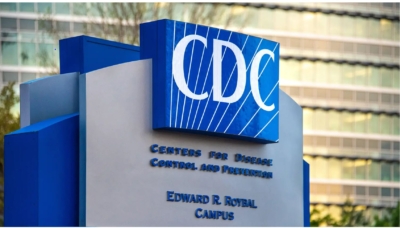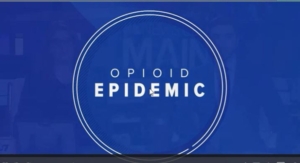
Former Rhode Island Rep. Patrick Kennedy speaks at the dedication of the Edward M. Kennedy Institute for the United States Senate, in Boston. (AP Photo/Susan Walsh, File)
It was fall 2008 and the economy was plummeting. The financial crisis was the only issue on anyone’s mind.
So, as Patrick Kennedy tells it, he called his ailing father to ask for a favor.
Kennedy, then a Democratic congressman from Rhode Island, was the lead sponsor of legislation aimed at getting insurance companies to cover behavioral health services in the same way they did physical health. But, with Congress focused on saving the economy, Kennedy saw chances for his bill’s passage slipping away.
The late-Sen. Ted Kennedy (D-Mass.) had co-sponsored a similar measure in the Senate. The young congressman asked his father to use his goodwill to press colleagues to take up their mental health bill. The elder Kennedy called his friend, then-Sen. Chris Dodd (D-Conn.), who at that moment was the most powerful man in Washington, as the chairman of the Senate Banking Committee, to see what could be done.
And something could: Dodd used Rep. Kennedy’s mental-health bill as the vehicle for the bank bailout known as the Troubled Asset Relief Program, or TARP.
“I’m the sponsor of the largest federal bailout in American history,” Kennedy said in a recent interview. “The good news was [mental health parity] passed. The bad news was that no one knew about it because it was overshadowed by the economic aspect of the bill.”
The law requires an insurance company to offer mental health and addiction treatment coverage on par with its physical health benefits. The requirement was then bolstered a few years later by the Affordable Care Act, which made behavioral health an essential benefit in plans offered on the individual and small-group marketplaces.
Yet in the decade since that law’s passage, there still remain barriers to care for people with mental-health conditions or substance-abuse disorders. Congress took another big step yesterday when it passed a large package of bills aimed at the opioid epidemic — but experts warn that it is far from enough to truly tackle the scope of the problem.
So, to mark the 10th anniversary of Kennedy’s bill passing, the former congressman, with a group of other mental-health advocates, released an analysis that found 32 states did not ensure equal coverage for behavioral health.
The report, a joint effort by the Kennedy-Satcher Center for Mental Health Equity, The Kennedy Forum, The Carter Center, and Well Being Trust, gave each state a letter grade on questions like whether an insurer requires a patient to pay a separate deductible or higher co-pays for behavioral health or sets limits on how many times they can see a behavioral health provider.
The worst offenders, according to the report, were Wyoming, Arizona, Idaho and Indiana, which all received Fs. The only state to receive an A was Illinois.
“When you’re in the midst of a mental health crisis you don’t have the time to fight with your insurance company,” said Dr. Glenda Wrenn, director of the Kennedy-Satcher Center for Mental Health Equity at Morehouse School of Medicine. “We put so much on the shoulders of people in the worst possible places in their life.”
Americans also have no idea what consumer protections they’re supposed to have for mental-health care, so they don’t know how to fight back. An American Psychological Association survey in 2014 found only four percent were even aware of the parity law’s existence.
Yet one positive dramatic shift in the past decade is the increase in Americans talking about and sharing their experiences with mental health. There’s been a growing public awareness of the magnitude and seriousness of the issue, which was punctuated this year with the suicides of fashion icon Kate Spade and TV travel host Anthony Bourdain.
From Prince Harry to Michael Phelps to Kristen Bell to everyday people on social media, people are increasingly disclosing their illnesses. Just this week, a rising star in the Democratic Party, Jason Kander, dropped out of his race to be mayor of Kansas City to focus on treatment for his depression and PTSD from his service in Afghanistan:
The statistics can be staggering. While one in five Americans experiences a mental illness in a given year, more than half of them didn’t receive treatment, according to the National Alliance on Mental Illness. Suicide rates are rising in nearly every demographic, but especially among teens. The World Health Organization named depression the leading cause of disability worldwide.
Every person who “comes out” does his or her part to chip away at the social and self stigma that has long kept people from telling loved ones or their workplaces when they are sick. But, as I wrote in June 2016, there was has been a sea change in the way people with mental health conditions, mostly on social media, share and are now being celebrated as brave and strong for sharing their stories. Those adjectives alone are incredibly powerful — when someone is in the throes of depression, they do not see themselves as either.
But Kennedy, who has struggled with addiction and depression and said he watched his father silently suffer from post-traumatic stress disorder over the murders of his two brothers, told me that what has been missing from the movement is an organized effort to hold the government and lawmakers accountable.
Kennedy also launched a website this week called “Don’t Deny Me,” to give consumers a place to report insurance companies that decline to cover their mental health and substance use disorder treatments. It will take, Kennedy told me, a true grassroots mobilization to finally get these issues prioritized.
“There are plenty of solutions to bring people the care they need, but what is missing is the political will and the economic and legal pressure to make it happen and that’s why we’re marking the anniversary,” he said. “We look at it as the medical version of the civil rights movement.”








Leave A Comment